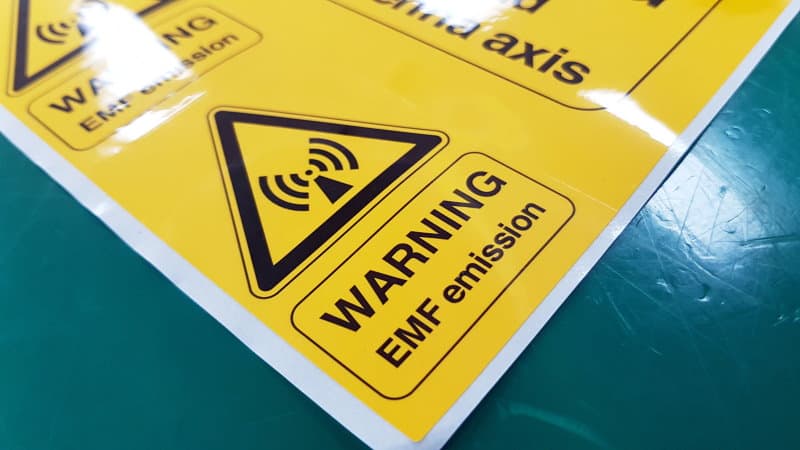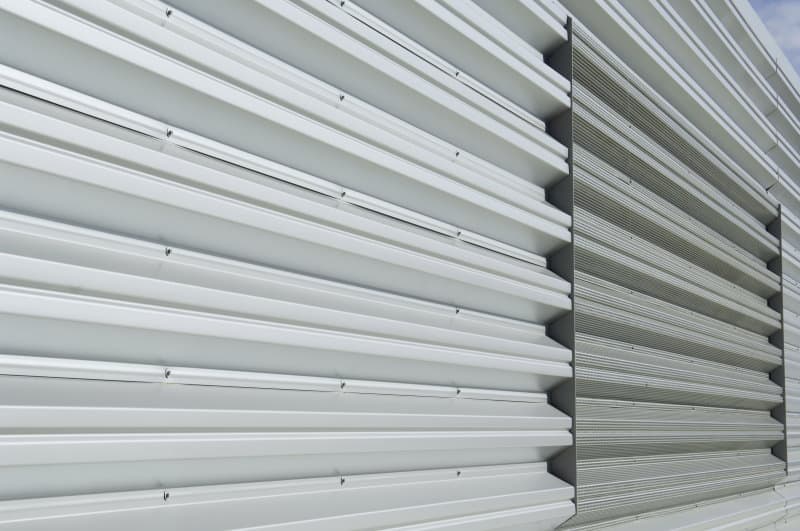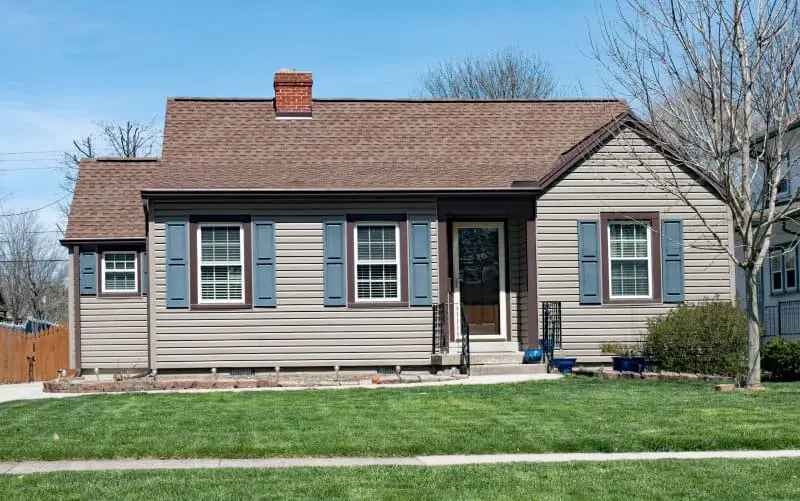The action of cell towers and satellite masts is a major EMF source around the home and the workplace. Thus, it is important to protect our homes from EMF radiations using building materials. Read on to learn about building materials that can be used to protect your home from EMF radiations.
Aluminum siding can block EMF. It gets the ability to block, or better still, attenuate EMF radiations from the presence of aluminum metal used to make it. Aluminum siding is thus one of the building materials that can be used to reduce EMF effect from residential and commercial buildings.
Apart from having to protect ourselves from the EMF emanating from electrical appliances and wireless gadgets within the house, there is a need to defend against those coming from outside. If you have a cell tower or a powerful EMF source around your house, you will find this article beneficial. This is because you will learn about ways to protect your buildings from external sources of EMF.
How Does Aluminum Siding Block EMF?
Aluminum siding is a building material. It is also known as a cladding material, as it is not used in the building’s actual construction. It is rather used as a decorative material to give the building better aesthetics and feel.
Consequently, aesthetics is not the only benefit realized from the use of aluminum siding in a building. Aluminum siding is also used to protect the building from external sources of EMF radiation. This is possible because the major material used in the production of aluminum siding is aluminum.
Aluminum has long been established as an effective material used in blocking or attenuating EMF radiation. This is evident in the use of the material in aluminum foil, which is a very popular tool in defending against EMF dangers.
However, one tends to ask the question, why does aluminum block EMF? What properties or features make aluminum so effective in the defense against EMFs? The answer to these questions will be given in the next section.

The Action of Aluminum against EMF
First and foremost, aluminum belongs to the class of elements known as metals. Metals generally have the ability to block or at least attenuate EMFs due to their conductivity. The higher the conductivity of a metal, the better its ability to block EMF radiations.
The number of free electron carriers determines the conductivity of a metal. These free electron carriers on the metal surface will form a line of force that reflects the incoming EMF away. This is done in a series of reactions between the free electrons and the approaching EMF particles.
Aluminum, as said earlier, is not only metal but a powerful one at that. It is highly conductible, which is evident in its use of electric cables and wires. Thus, it only makes sense that it will be a very effective source of EMF blocking.
However, there is an important point to note. When metals such as aluminum are used as a cladding material or a piece of protective equipment against EMFs’ external sources, the amount of EMFs generated internally will increase. This means that there will be more EMF radiation within the space protected by aluminum or any metal.
Here is why. We have established that strong metals like aluminum block EMFs by reflecting the approaching EMF away. Thus any EMF emitted with space will not get out as they will be reflected back into the building.
It is thus important to note this and consider this possibility whenever a metal or aluminum siding is to be used as a protective element in a building.
Other Advantages of using Aluminum Siding for your Buildings

Apart from protecting your buildings from external sources of EMF, using aluminum siding as a cladding material for your buildings holds many benefits. Some of these benefits relate to your health, finances, and the aesthetics of the building.
Some of the benefits are examined below:
1. Affordability
Aluminum sidings are a really affordable piece of building materials. Despite their protective and aesthetic features, you may be surprised to realize how cheap and affordable aluminum sidings are.
The reason for the low cost of the material is that most aluminum sidings are made from recycled aluminum materials. As a result, the cost of production is really low.
Moreover, aluminum sidings are lightweight and easy to work with. Thus, contractors and laborers who would fix it in your house will charge less since there is very little or no difficulty working with the cladding material.
2. Environmental friendly
Aluminum sidings are very eco-friendly materials. Firstly, this is because it is majorly made of recycled materials. This means that aluminum sidings do not constitute an environmental waste. This is another avenue to save money as you can recycle your old aluminum sidings to make a new one instead of buying another cladding material.
Secondly, aluminum sidings are energy efficient as they help conserve weather. This is made possible through the energy-efficient feature that aluminum has.
During winter, when everything is cold, aluminum sidings can help you maintain the warmth within. It does this by preventing the chilling weather element from passing through into the building. In the same vein, it helps maintain the cool atmosphere within a building during the summertime.
3. Low maintenance
Aluminum sidings are one of the building or cladding materials with almost zero maintenance costs after years of use. Aluminum does not rust, nor does it get battered by weather elements. Besides, aluminum is also waterproof.
Therefore, there is very little to do or worry about as regards maintaining it for use. The only action that needs to be taken includes rinsing and clearing any form of debris that might have stuck within the siding due to wind or draught.
These are some of the advantages of using aluminum siding as a cladding material for a building.
If you want to know if aluminum foil can ruin a phone, take a look here.
Disadvantages of Using Aluminum Siding as a Cladding Material for a Building
While aluminum cladding has many benefits as a cladding material, it is not without some disadvantages. Let us examine some of these disadvantages
-
Increase in the amount of EMF in a building
In what seems like a backlash of its action against EMFs, aluminum doesn’t allow EMF radiations to get out of space. Hence, it is really difficult and almost impossible for EMFs produced within a building to escape from the building as long as aluminum siding is used. This invariably increases the amount of EMF present in a building.
-
It can be noisy
Aluminum sidings can constitute a form of disturbance to users and homeowners as a result of noise. There are many ways by which an aluminum siding can cause noise.
The first is through the process of expanding and contraction. Aluminum is a metal, which means that it expands when it is hot and contracts when cooled. Some uncomfortable sounds can accompany this process.
While these sounds may not be very loud, users with a keen sense of hearing will hear these sounds.
Another way through which aluminum sidings can be noisy is the effect of weather elements such as rain. When it is raining, water droplets on the aluminum siding may make disturbing sounds to the homeowner.
While many homeowners may not mind, it may feel discomforting to some.
-
Out of style
Lastly, aluminum sidings are old and not well used again. Many cladding materials have been designed and manufactured. These new materials have better aesthetics and add a bit of sophistication to buildings with which they are used.
Also, the use of aluminum siding may affect the price or the seller’s bargaining power if need be. This is because it is already old cladding materials, hence its presence in a building may affect its valuation by a real estate professional or the buyers themselves.
This disadvantage, however, will be minimized if the building is not for sale. Moreover, it wouldn’t matter if the protection against EMF radiation’s dangers is prioritized over aesthetics and beauty. Therefore, it can be said that this last disadvantage may not affect everyone using aluminum sidings in their homes or buildings.
Conclusion
While many efforts have been directed towards the prevention and protection from EMFs generated from wireless gadgets and electrical appliances, similar efforts have been put on the ways of protecting people from external sources of EMFs. As such, many building and cladding materials have been identified as effective EMF blocking materials. One of such is aluminum sidings
Aluminum siding is a cladding material that can effectively block EMFs from external sources such as cell towers and network masts. The aluminum siding ability to do this is based on the conductivity of aluminum metal used in its manufacture. This and many other benefits such as affordability and low maintenance are advantages that homeowners get from using aluminum siding in their homes.
While aluminum siding prevents the influx of EMFs from external sources, it also prevents EMF escape from within, thereby increasing the amount of EMF within a building. This constitutes one of the demerits of using aluminum siding as a cladding material in a building.


